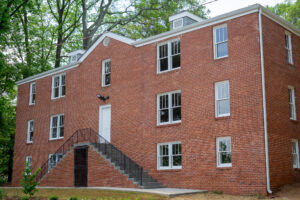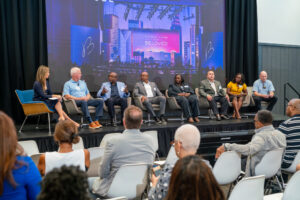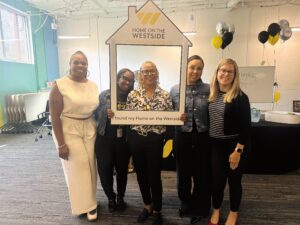On Friday, November 21, the Westside Future Fund (WFF) welcomed community members, partners, legacy residents, and local leaders to the monthly Transform Westside Summit. This month’s program featured Dr. Eloisa Klementich, President & CEO of Invest Atlanta, in a conversation with WFF President & CEO John Ahmann discussing “How Invest Atlanta is Advancing Economic Opportunity on the Westside.”
The morning opened with a moving devotion delivered by Avona Lee Bridges, Compliance and Asset Management Specialist with Invest Atlanta and a Home on the Westside homebuyer, whose personal testimony set a powerful tone for the day’s conversation about resilience, opportunity, and the work of rebuilding community together.
Following the devotion and introductions from attendees across the Westside, Ahmann welcomed Dr. Eloisa Klementich to discuss Invest Atlanta’s work advancing economic mobility citywide and the agency’s commitment to the Westside.
Klementich opened by outlining what inclusive growth means for the agency: ensuring all Atlantans have meaningful pathways to success and designing programs that intentionally reach communities historically excluded from opportunity.
Data-Driven Strategy for Equity
Klementich described a framework developed six years ago using 32 metrics — from third-grade reading levels to access to transportation — to identify neighborhoods with the highest barriers to economic mobility.
This approach revealed a clear pattern: the majority of communities with the greatest need are located south of I-20, including many neighborhoods across Atlanta’s Westside.
By applying this data to program design, Invest Atlanta ensures that its resources — including small business support, affordable housing financing, and community development tools — are deployed where they can make the greatest impact.
“When we are purposeful, we can move the needle,” she explained.
The Westside Is Leading Today
When asked about the next 5-10 years, Klementich emphasized that meaningful progress is already happening on the historic Westside, thanks to strong community quarterback organizations including Westside Future Fund.
She emphasized the importance of collaboration, noting that Invest Atlanta’s role is to support the broader ecosystem by aligning housing, jobs, education, safety, and community development efforts.
Programs and Tools Available Now
Klementich highlighted several key programs Westside residents and business owners can access today:
- Small Business Loans: Low-interest loans at 3% and below, offering alternatives to credit card debt and supporting business expansion.
- Down Payment Assistance: Programs that significantly reduce barriers to homeownership for first-time buyers.
- Anti-Displacement Tax Fund: A partnership with WFF providing long-term tax relief for legacy homeowners.
- Faith-Based Development Loans: Forgivable loans helping churches explore affordable housing opportunities on underutilized land.
- Affordable Housing Tools: Financing options for developers building both single-family and multifamily affordable housing.
The Future of the Westside TAD
Klementich also addressed the importance of the Westside Tax Allocation District (TAD), which Invest Atlanta administers. Current discussions about potential changes in county participation could significantly reduce available funding for affordable housing and infrastructure.
Using a powerful metaphor from her childhood, she explained that removing the TAD would be like taking away a critical tool from a builder’s toolbox.
“You can hammer a nail with the handle of a screwdriver,” she said, “but it’s much harder. The TAD is the hammer. We need every tool we have to continue delivering impact.”
Ahmann closed the summit by thanking Dr. Klementich, Bridges, and the Invest Atlanta team for their leadership and partnership. He reiterated the importance of collective action in building a community Dr. King would be proud to call home.
Missed the event? Watch the full November Transform Westside Summit on YouTube.










